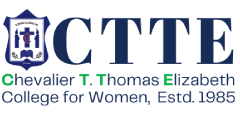பொதுத்தமிழ் Paper I – CLA1L
மாணவியர்கள் இந்தப் பாடத்தைக் கற்றலின் முடிவில்,
- நாட்டுப்புற இலக்கியங்களின் வகைப்பாடுகள்,சிறுகதை, உரைநடை, மரபு கவிதை, புதுக்கவிதை ஆகியவற்றின் ஆசிரியர் குறிப்புகள், அவ்வாசிரியர்கள் வாழ்ந்த காலச்சூழல், அவர்கள் எழுதிய நூல்குறிப்புகள் முதலானவற்றை நினைவில் கொள்கிறார்கள்
- படைப்பிலக்கியங்களின் முக்கியத்துவத்தையும் இலக்கியங்களின் தொன்மையையும் புரிந்து கொள்கிறார்கள்
- ஊடகத்தில் மொழியைப் பயன்படுத்தும் முறை, துறைசார்ந்த கலைச்பசொற்களை அறிந்து கொள்ளுதல், சொற்களின் பொருள் அறிதல் ஆகிய மொழிப்பயிற்சியைப் பெறுகிறார்கள்
- நாட்டுப்புற இலக்கியங்களின் வாயிலாகப் பெறப்படும் மனித உணர்வுகளையும் தற்கால இலக்கியங்களில் வெளிப்படும் சமூக அவலங்களையும் மதிப்பீடு செய்யும் தன்மையைப் பெறுகிறார்கள்
- நவீன இலக்கிய உத்திகளை உள்வாங்கி அவற்றைப் பின்பற்றிக் கவிதை, கட்டுரை எழுதும் திறனைப் பெறுகிறார்கள்
Hindi I – CLE1E
By the end of the course, students will be able to
● recollect the interesting words and phrases used in the prescribed texts
● practise writing leave letters, complaint letters, order letters, and enquiry letters
● analyse the concepts or themes in the prescribed texts
● write error-free official memos, government orders, notices, and various forms of official correspondence
French I – CLK1S
By the end of the course, students will be able to
● remember basic words and phrases related to transportation, fruits, and vegetables
● understand basic grammar concepts like articles, prepositions, verbs, and adjectives
● practise pronunciation using listening comprehension activities
● analyse sentence structures in simple texts
● write short essays using simple vocabulary



